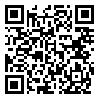BibTeX | RIS | EndNote | Medlars | ProCite | Reference Manager | RefWorks
Send citation to:
URL: http://jdisabilstud.org/article-1-2173-en.html
2- Iran University of Medical Sciences
Background & Objectives: Depression disorders are prevalent and cause considerable suffering and disease burden. According to the World Health Organization, more than three–quarters of people in the developing world who have mental disorders (such as depression) do not receive any treatment because of limited geographical access to trained professionals, a therapist, expensive treatment sessions, and cultural problems. One solution is telemental health or using digital technology to provide long–distance mental health care, especially with the expansion of the Internet and smartphones in the last two decades. The ease and convenience of scheduling a therapy appointment online and chatting with a therapist from the privacy of one's own home—or wherever one may want—is a huge draw for consumers, many of whom are seeking therapy for the first time in their lives. It helps normalize mental health care, especially among generations who are so accustomed to interacting with people using technology, and eliminates so many barriers. The current study aimed to compare the effectiveness of online text messenger–based cognitive–behavior therapy (by WhatsApp messenger) with in–person cognitive–behavioral therapy on persistent depression.
Methods: This is a quasi–experimental study with a pretest–posttest design with a control group. The study population included all 18– to 55–year–old people referring to four counseling and psychology clinics in the west of Tehran City, Iran, in 2018. After observing the inclusion and exclusion criteria of the research and implementing the Beck Depression Inventory–II (BDI–II) (Beck et al., 1996), Structured Clinical Interview for DSM–5 (SCID–5–CV) (First et al., 2016), and Diagnosis by a psychiatrist and psychologist, 30 patients with persistent depression were selected as the study samples. They were chosen by convenience sampling and randomly divided into three groups: online text messenger–based cognitive–behavior therapy (by WhatsApp), individual in–person cognitive–behavior therapy, and controls. All study subjects completed the Beck Depression Inventory–II (Beck et al., 1996) before and after the treatment. The members of two experimental groups received cognitive–behavior therapy in 8 sessions, but the controls received no treatment. Data analysis was performed with descriptive statistics (mean and standard deviation) and inferential statistics (one–way analysis of variance and Chi–square tests to compare the age and gender of the groups, analysis of covariance, and Bonferroni's post hoc test) in SPSS version 22. The significance level of the tests was considered 0.05.
Results: The findings showed that both interventions, i.e., online text messenger–based cognitive–behavioral therapy (by WhatsApp messenger) and individual in–person cognitive–behavior therapy, significantly (both p<0.001) decreased persistent depression in patients compared to the control group. However, no significant difference was observed between the two mentioned methods (p=0.690).
Conclusion: According to the findings, persistent depression (mild and moderate) can be improved after using psychological interventions such as individual in–person cognitive–behavioral therapy and online text messenger–based cognitive–behavioral therapy (by WhatsApp messenger). None of the methods was more effective than the other in reducing persistent depression, and both are equally effective.
| Rights and permissions | |
 |
This work is licensed under a Creative Commons Attribution-NonCommercial 4.0 International License. |



